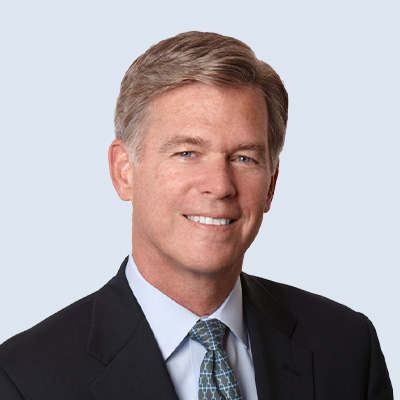Executive Viewpoint: Dan Shine, Thermo Fisher Scientific
Gary Tubridy, principal at the Alexander Group, spoke with Dan Shine, SVP and President, Analytical Instruments at Thermo Fisher Scientific, to discuss the importance of mission, culture and talent and how his company uses it throughout their organization.
Dan shares what it means for Thermo Fisher to be an enduring leadership company among their employees and customers.
Gary Tubridy: Hello, this is Gary Tubridy, principal at the Alexander Group, and I’m here today with you to explore the elements of enduring leadership. Research that the Alexander Group is doing and to the importance of mission, culture, talent and operations, and building companies and executive leadership that lasts. I’m here with Dan Shine, senior vice president and president of Analytical Instruments at Thermo Fisher Scientific.
Dan, let me start off by talking a little bit about topic number one: mission. Your website says the Thermo Fisher mission is to enable our customers to make the world healthier, cleaner and safer. That is one powerful mission. I wonder if you might elaborate on that a little bit more for me.
Dan Shine: I think it’s a living sort of way we think it touches us in many different ways. One, it’s a rallying cry for 100,000 plus colleagues, right? So I think people come to Thermo Fisher because they’re attracted by the mission. They want to do good in the world. And Thermo Fisher is a company that allows them to do that. So I think that’s good. When we think about resource allocations or acquisition targets, it’s one of the filters we use. Does this company help and align with the mission? Trying to make the world healthier, cleaner and safer. So I think it’s a way we kind of filter what the investments make, which markets we want to play in and which companies we want to add to the portfolio. So I definitely think it’s more than just kind of words on a page. I think it’s something that helps keeps us grounded on kind of what we do and why we exist and why it’s so important to be part of Thermo Fisher.
Gary Tubridy: So it sounds like you kind of return to that at points in the decision-making process and ask the question, Hey, does this make sense in the context of our mission?
Dan Shine: Exactly. And I think how we represent ourselves when we’re talking to governments and we’re talking to other stakeholders, investors, they know that this is important to us.
Gary Tubridy: You know, you said it’s a living, breathing thing. And that begs a question of from time to time, does it get updated to reflect certain realities of the market or the product line or the competition and such?
Dan Shine: Yeah, we’ve had it fairly static for a while, I think. I don’t know exactly what year we rolled out, but probably been a decade. And it goes back to when Mark Ashford took over as CO. I think he wanted to kind of put this out there, but I think it’s still alive today as it was back then. I’ve been in the company for 24 years. I know a bit of the history and we were founded out of MIT. Thermo Electron was the original company name, and the goal then was to use technology to solve societal problems. Which sounds like trying to make the world healthier, cleaner and safer. We might have similar words, but I think at the company’s core has always been about using technology to make the world better.
Gary Tubridy: Well, I think that cleaner, safer phrase kind of does update it to the world in which we live, where we’re all very much tuned into the notion of making the world a better place and having corporations do their part. I think that that fits very well. Let me shift for a second to culture and ask, you know, what words would you use to describe the Thermo Fisher culture? I love the fact that it actually came out of an MIT background and has become so successful from there. How did the culture start and where is it today?
Dan Shine: Yeah, one thing just from my last question before I answer this one, we do talk about modernizing it or updating it right, the one lens is we’ve grown. The company has grown a lot in the past several years. We’re big enough now, it’s like maybe it’s not just enabling our customers, but maybe we have an actor role as well. What are we doing about sustainability and things like that? I think that is somehow embedded going forward. When I think about culture, we have four values and every company has values about integrity and innovation, involvement, intensity. We have four values that we rally around. We measure people against those in the interview process, do you live our core values? And we have got criteria behind those. So that’s part of our culture. When I think about the way we lead, there’s a lot of servant leadership. Many of us have been around for a while and it’s less about us, it’s more about our teams. And if our team succeed, then we succeed. So I think that’s been part of the culture we’re trying to drive. It’s a very humble culture and these are things you might not find in the annual report and stuff like that. But Mark’s very humble, very smart, very humble. And the rest is this kind of leadership team embodies that as well, right? So it’s about servant leadership, it’s about being humble, it’s about rolling up the sleeves and trying to get the job done for the customer. I think all of that comes into play. When I think about my own success for 24 years, it’s really been about transparency. You just call it like you see it, it’s about empowerment. You make sure you knock down roadblocks for your team to be successful and it’s about accountability. Doing what you say you’re going to do. I think those are some things I always remind my team to make sure we do those things well.
Gary Tubridy: Tell me about that intensity word. I kind of like that. I’m curious what that means in practice.
Dan Shine: Yeah. I mean, it really is going the extra mile for the customer, right? It’s like getting that order at 4:50 and getting it out before you leave. It’s about pushing towards the deadlines for an R&D project. It’s about understanding kind of obviously we’re a public company, right? Understanding the quarterly commitments and finding a way to get there, even if the original plan changes. It’s having that dedication to find a way to get there. It really is just pushing for all of our stakeholders be successful and our colleagues as well.
Gary Tubridy: And are there tools or processes that you used to enhance or strengthen that culture to make it come to life?
Dan Shine: Yeah. When I think about, we have different business for you, so I think we have foundational processes around strategic plans. We have human resource reviews, we have quarterly business reviews and annual budgets. So we have a typical rhythm around all of those and then different businesses based on their cadence, mine is an instrument business. It tends to be more quarterly. Some are more run rate consumable type businesses. They’re more daily or weekly. They have different operating methods as well. But at the end of the day, it’s really coming back to our stakeholders, our colleagues, our customers, our communities and our investors.
Gary Tubridy: Where would you say Thermo sits in the team versus the individual spectrum?
Dan Shine: Yeah, I don’t know if it’s scoring a score of 1 to 10. I think we’re like an eight. There’s definitely more about team and this concept of we wouldn’t lose as a team. When you look at our senior leaders, we don’t take credit for things, right? We make sure the team gets credit. We take the blame. So of course, we take the blame, but we don’t take the credit. We share the credit. And I think that kind of filters down through our organization. I think we try and build a more team atmosphere. And one of our values, like I mentioned, was involvement. So it really is winning and losing together.
Gary Tubridy: You know, I liked the term you used earlier on accountability. I want to return to that. Just ask that question about, there’s a balance between strict accountability and forgiveness for good try, but we didn’t make that. And again, there’s always a balance there. Where would you say thermo sits in this accountability spectrum between rigorously accountable and forgiving?
Dan Shine: Yeah. I think I always come back to velocity. Speed of decision making and velocity. So when things don’t go right, it’s not about, you screwed up. We always think we have good people. They’re trying to do the right things. When things don’t go right versus blaming, it’s more about what information did you need that you didn’t have? What assumptions did you make that were wrong? And how can you make sure you don’t make the same mistake again? But I think if you frame it that way, it allows people to kind of, you know, not necessarily fail, but learn and not repeat mistakes. And I always like the analogy. I coach my daughter’s basketball teams and I tell them I’d much rather take ten shots and make seven and take two shots and make two. And that gets back to it’s okay, not everything’s going to go right. You’ll course correct and fix it. But you create an environment where people are okay to take some chances.
Gary Tubridy: Yeah, it sounds like there’s an assumption of goodwill on the part of folks and maybe a little bit of sharing that burden. If mistakes were made, maybe I should have done something differently to help you succeed.
Dan Shine: Exactly.
Gary Tubridy: When you think about cultural improvement, sometimes experimentation is a word that’s used. And experimenting requires something along the lines what we just discussed. People have to be in a position of going for it. Putting that experiment out there, trying some things and allowed to fail from time to time. As long as we learn from that. How do you react to that term experimentation? Is that something that you do at Thermo?
Dan Shine: Yeah, we call it more pilot and lighthouses, right? So I think given our size and our scale, if we bet the farm, it can cost us billions if we get it wrong. I think we do tend to pilot we’ll look at a different geography, look at a specific area to kind of ring fence it.
Gary Tubridy: Do you get any requests for such pilots from the bottom up? People want to try something and they’ll say, Hey, Dan, what do you think about this? What if we went after this in a different way? Want to try to pilot that? Do you get any of that?
Dan Shine: Yeah, I think we have our consistent pilot methodology is called PPI for practical process improvement. And that’s where we have, we call it just do it. I think that’s where we say, all right, if it makes sense, obviously, pilots tend to be more broad-based type programs, but a lot of the stuff that would be bottoms up, it’s like just do it if it makes sense. Try it and see if it works.
Gary Tubridy: So there are actually programs in place to elicit that kind of input from the people who are on the ground and might have some pretty good ideas.
Dan Shine: Yeah, they have lots of good ideas and we have a lot of our productivity gets driven by their great ideas.
Gary Tubridy: Yeah. Again, there is a presumption of goodwill and maybe some brainpower on the part of folks throughout the organization. Which brings me to the talent subject. So Thermo by all accounts has great talent. And my first question is what attracts such good talent to come to Thermo?
Dan Shine: Yeah, I think some of it’s been our success, right? So I think we’ve been successful over a long period of time. Part of the reason we’re having this interview, and I think people noticed that. They noticed we’re a technology leader. We invest in having the best products. If they’re innovative, they get drawn by that. If they’re in our space, they understand the impact we’re having on clinical trials and drug manufacturing and stuff like that. If they want to work for a market leader, we are clearly that. Our size and scale allows us to appropriately claim that title. I think that attracts a lot of people. And then once they’re here, why do they stay? Why am I here?
Gary Tubridy: Yeah, right. That’s my next question. You anticipate.
Dan Shine: I could be a CO for Business Unit and running that as well. But I continue to grow. I continue to get challenged with our growth. It allows us to kind of keep learning. There’s this continuous learning sort of aspect of things. And I think our annual review process is quite effective. We ask our colleagues, including myself, where do you want to be in two years, 0 to 2 years? Where do you want to be in 3 to 5 years? And then kind of develop a development plan that allows you get the right experiences. It helps map you towards those goals. I think those conversations with your supervisor are effective and it still happens even at the senior levels.
Gary Tubridy: I guess that’s an important question. And that is, you know, not only do you have a reputation for having good talent, you’ve got a reputation for having really good management. And so people stay and then they acquire management capabilities. I’m wondering if you could dig a little more deeply into, how do you build such a good bench of management strength?
Dan Shine: Yeah, it’s hard. I think when we think about where we’re always most worried about, do we have the depth to kind of match up with our growth ambition? So we invest a lot in training programs, in different cohorts and tools to kind of help them augment their on-the-job experiences. We have real dedication to that. So that’s part of it. And then I think it’s really, you know, people get thrown in the deep end all the time and they learn it, right? You do that enough, you don’t get scared, right? It’s like, okay, I’m the deep end again. I know how to avoid the sharks and everything else. And I think sometimes people just build that self-confidence as well.
Gary Tubridy: Yeah. Let’s kind of go back to that, make sure I got this right. That’s kind of a practice on the part of the company. People have to get put into positions that matter. The deep end, things are at stake and you’ve got to let them swim a little bit. You’re looking out for them. But they’re given the latitude to make some decisions. And that kind of forges a pretty strong management discipline if you do that often enough.
Dan Shine: Yeah. And I think sometimes it’s out of necessity. The growth we had during COVID was unprecedented. People just had to step up and figure it out. But I think Mark is intentional. I think he knows all the answers, but he only gives you half of them. You know, you have to figure out the rest of yourself. But yeah, and I think it’s really putting people in those situations and giving input, but not direction, because I think that’s a big thing. A lot of times people just want to kind of elevate the decision to their boss and let them make decision. We try and avoid that. I’ll make this decision if I have to. But you explain why I have to be the one to make this decision.
Gary Tubridy: Yeah. Not to name names. Is there any example that comes to mind where something like that came up? A situation like that came up and that individual was given the authority and learned from it.
Dan Shine: No specific examples, but an R&D program or like where it’s used to invest in R&D. And sometimes we have kind of business unit leaders, and sometimes there’ll be programs that kind of cross divisions. It might be more workflow based. I think I want to kind of invest in this area, but only half of it is in my responsibility. So that might be one where I understand why it has to be elevated to me to make the decision. And sometimes it’s really just inside their own business unit and you have to choose between two product lines and which one has the best growth potential and let me know your thinking. And a lot of times it’s asking the right questions. So it’s like you lead them to the answer based on the questions you ask. So I think the senior leader is trying to get better and better at that, like asking the right questions. So it’s their idea. And then they work twice as hard to make sure it works right.
Gary Tubridy: Asking the right questions. If you ask the right questions, you can solve just about any problem. But the questions require some thought. Diversity, equity. inclusion is an important part of the management of a company and the management talent base. And I’m wondering if you could share anything about what DEI kinds of initiatives you have online at Thermo?
Dan Shine: Yeah. I think we’re never satisfied like where we are as far as female, people of color, Hispanic, you know, all the different categories that most people look at. We look at which ponds we’re fishing in. Are we drawing the right slate of people from different backgrounds and experiences and races? I think we’re trying to expand where we find applicants, looking at different historically black colleges and universities and things like that. Maybe we didn’t recruit there as much. And part of it is given our size and our scale, we can always only post so much from our industry, right? We’ve gotten big enough we need to kind of, one, develop early-stage talent through internships and programs and stuff like that. And then two, look outside our industry, but really attract people with e-commerce skills or stuff that might not be quite our industry but relevant for what we’re trying to accomplish. I think the most fundamental way we’re trying to do that is through diverse slates and making sure that a diverse candidate slate tends to lead to more diverse hires. And then we have different programs like business resource groups. Once we have a diverse population that they feel good here and they want to stay. We don’t have one door out the back door.
Gary Tubridy: Yeah. It’s so important to get a foothold. And once you have that, then you can start building on that. But taking the right actions to visit the right campuses and the right places to find a diverse population. That’s hard to do. It seems like you’ve taken the right steps there.
Dan Shine: Yeah.
Gary Tubridy: On a practical level, we’ve got hybrid jobs that so many jobs were executed on a virtual basis during the pandemic. Now the offices are back open and there’s that big question, are we going back? If so, how much? What’s the philosophy at Thermo in terms of work remotely versus work in person? How are you handling that balancing act?
Dan Shine: I think during the pandemic, we looked at what roles should be office space, which ones could be remote, and we went through a more dedicated classification, remote versus office. Roughly speaking, 80% are kind of office space, 20%, maybe went remote. More in that category. We’ve had flexibility. We said, all right, office space being the office, three days two flexibility. But our overarching belief is office space people are more effective in the office. They have better learning and on the job training office, they get better assignments if they’re in the office, they build better networks and collaborate better if they’re in the office. We’re definitely trying to push more back towards pre-pandemic levels, but with increased flexibility. For example, I was in the office this morning, came home to have lunch with my daughter, who’s home from college, and I’ll work at home in the afternoon. That was easier to do now than I could before. But I think the overarching thing is, if you’re supposed to be office space, let’s get back to the office and we’re going to try and push more and more of that in 2023.
Gary Tubridy: Yeah, it brings me to my last couple of questions. One is, with the economy looking like it’s taking a turn for the worse, if you want to listen to economists and that may or may not be a good idea. What’s your sense and what steps are you taking to prepare your organization for a possibly bumpy ride in 2023?
Dan Shine: Yeah. So we’ll see if it plays out that way or not. But we have lots of history having the leadership team being through different recessions and downturns. Our approach is always how do we exit stronger? How do we turn this into a positive? If things get tougher, that means valuations come down, so maybe more aggressive on the M&A front and bring those companies into the fold. There’s always a greater push on productivity during downturns, right? And zero-based budgeting, right? You’ve got a fixed cost base. What’s the best way to reallocate that and to funnel your growth and invest in the right activities? I think we’ll see more and more of that. We’ve been fortunate through the pandemic. We’ve had a lot of COVID relief type business and vaccines and stuff like that that allow us to be very aggressive on investments and accelerate our growth plans. But I think the environment, if it gets tougher, just forces us to get back to that core discipline of profitable growth.
Gary Tubridy: Yeah. Does your planning approach differ as between a high growth future versus a lower growth kind of a future? You mentioned zero based budgeting as an example. Are thee other things that you do?
Dan Shine: I think it’s more contingency based, like what are your contingencies and more of a conversation around those know if it’s a 5% remote chance that things get worse, you have a smaller conversation on it. If it’s a 25% chance, you’re going to understand, is it well thought out? Do you have plans? It’s a lot easier to kind of come up with your contingency plans before things get bad. So just make sure people and the teams are challenging themselves and looking in the mirror and being honest about if things get tough, where is it going to get tough? In my case, instruments may slowdown because they’re capital equipment, but service might be an opportunity. So how do I pivot more towards service and people try and keep the stuff up and running longer? I think a lot of it gets back to just what’s plan B and plan C versus.
Gary Tubridy: Last question, in a down economy, are there areas where you still say, look, we might not invest as much, but we still have to keep investing because it’s that darn important?
Dan Shine: Definitely. And I think we’ve demonstrated that in the past. And to my opening comment about exiting stronger. R&D is one area that is kind of our lifeblood and investing in new products. And then we’re pretty diversified in 55, 60% of companies in pharma and biotech, which typically holds up better than maybe industrial type businesses. If our competitors don’t have that sort of profile and they have to cut back further and we can invest faster, we’ll have a lead when we come out. And then how do you build off that lead as the economy gets stronger again?
Gary Tubridy: Yeah, I love that idea that a downturn is an opportunity to come out stronger. Those are the words of optimism. Thanks so much for joining us today. Really appreciate it.




